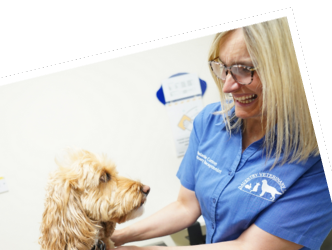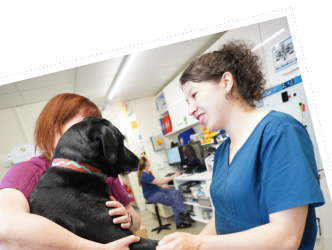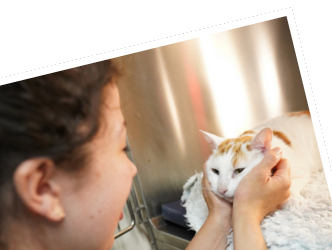
Vaccinations for dogs, cats & rabbits
Daventry Vets is passionate about educating pet owners. Whether you own a dog, cat or rabbit, our experienced team will be happy to answer any questions you may have about the vaccinations we offer and how they can protect your pet.
Book a vaccination
Benefits of pet vaccinations
Which diseases do we routinely vaccinate against?
- Canine Parvovirus: A very nasty viral disease which causes severe vomiting and diarrhoea. Still occurs in pockets throughout the UK and is usually fatal.
- Canine Distemper (Hardpad): Another severe, usually fatal disease. Rare in the UK in recent years due to vaccination, although there have been more cases in the last few years.
- Infectious Hepatitis: Still exists in the UK, although now rare due to vaccination. Often fatal.
- Leptospirosis: Contracted from the urine of rats and small mammals or other dogs. Canals and rivers can be contaminated and bacteria that cause this disease are widespread in the UK. It can also cause severe disease in humans (Weil’s disease).
- Kennel Cough: Causes whooping cough-like symptoms. More common in areas where dogs gather together i.e. kennels, dog shows, training classes, anywhere where lots of dogs are walked.
Vaccination courses for puppies
Puppies need 2 vaccinations:
- 1st vaccination – usually given at between 6 and 8 weeks of age
- 2nd vaccination – usually given from 10 weeks of age
Our vets will advise you of when you can take your puppy out after their second vaccination.
Booster vaccinations for dogs
To maintain immunity against the diseases mentioned above. Dogs require an annual booster vaccination.
After the first booster vaccination, dogs only need vaccinations against Parvovirus, Distemper and Infectious Hepatitis every 3 years but booster vaccinations to protect against Leptospirosis and Kennel cough are required annually.
If your dog is enrolled on our Health Care Plan then the cost of their primary vaccinations and annual boosters are included in your monthly direct debit. Just book an appointment with our team and let them know your dog is a member of our Health Care Plan!
Which diseases do we routinely vaccinate against?
- Cat ‘Flu (Upper Respiratory Tract Disease): Unfortunately, this remains a very common disease in the UK. It can be very serious, especially in young kittens and elderly cats. Several microbes are known to cause the symptoms. Cats with ‘flu suffer from a runny nose and eyes and a high temperature; they feel lethargic and often won’t eat. Damage to the eyes (ulceration) can also occur.
- Infectious Enteritis (Feline Panleukopenia): An unpleasant and often fatal disease. Fortunately, vaccination has been extremely successful in controlling the disease and it is now relatively rare.
- Feline Leukaemia*: A viral disease, transmitted by close contact with other cats or fighting. The disease can take months to develop but then it begins to suppress the cat’s immune system causing secondary infections, tumours, and death. We are seeing less cats suffering from this horrible disease since vaccination became available.
* Vaccinations against feline leukaemia may not be necessary for cats who do not have access to the outdoors and do not come into contact with other cats. Talk to our team about your cat’s individual needs.
Vaccination courses for kittens
Kittens require 2 vaccinations:
- 1st vaccination – this is usually given at 9 weeks of age
- 2nd vaccination – this is usually given at 12 weeks of age
Booster vaccinations for cats
Annual booster vaccinations are required to maintain immunity against ‘flu, enteritis, and feline leukaemia.
If your cat is enrolled on our Health Care Plan then the cost of their primary vaccinations and annual boosters are included in your monthly direct debit. Just book an appointment with our team and let them know your cat is a member of our Health Care Plan!
Which diseases do we routinely vaccinate against?
- Myxomatosis: Myxomatosis is caused by a virus. It is spread by blood sucking insects, such as the rabbit flea and possibly mosquitoes. The insect transmission means that all rabbits both indoors and outdoors are vulnerable to infection. Following a bite from an infected insect, the symptoms of Myxomatosis take from 5 to 14 days to develop. Infection with Myxomatosis causes swellings around the head, face, anus, and genitals. These swellings progress to the point where eating and drinking become progressively more difficult, and death usually follows within about 12 days.
- Rabbit Haemorrhagic Diseases (RHD): This is a deadly viral disease that attacks rabbit’s internal organs and causes internal bleeding. Sadly it is fatal in most cases. There are 2 strains, RHD1 which causes sudden illness and if nearly always fatal in 1-2 days and RHD2 which has a slower course of illness and is usually fatal in 1-2 weeks. The virus that causes this disease can be spread very easily between rabbits but also indirectly via people, clothing, footwear, other objects, and fleas, so even the ‘House Rabbit’ is at risk.
Vaccinations against Myxomatosis and RHD
There is now a single vaccination which will provide immunity to both diseases and myxomatosis for one year. Vaccinations can be started from 7 weeks of age. Annual booster vaccinations are required to maintain immunity.
If you have any questions regarding your pet’s vaccination status, or you are worried your pet might not be adequately protected, contact us today.
Book a vaccination




